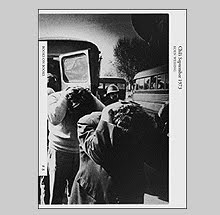Paris: Carnet de Recherche by Krass Clement
Seeing the name Paris scream across the cover of Krass Clement's newest book Paris: Carnet de Recherche I braced myself for disappointment. The "home" of street photography has produced numerous books in the past which find themselves amounting to little beyond "greatest hits" collections of images offering syrupy nostalgia and no surprise. Clement is well aware of those familiar trappings - perhaps that is why the cover image printed right on the book's cloth shows a romantic Paris metro X-d out by a couple of steel girders. His is an uphill battle which I am delighted to see proves he is an artist who tests our expectations.
As in the best of Clement's books, Paris: Carnet de Recherche is a personal journey. Starting with a suite of images entering the city by train, we pass by cold landscapes of factories in dense grey light. Upon arrival, the city itself and its citizens appear weighed down and sluggish. Light seems to fight to illuminate the architecture and streets. It is hardly a warm arrival - our first destination - an empty cafe.
Photographed in both 35mm and square formats, Clement weaves through the city lingering for moments on small sequences of images - a woman improvises a dance in a bar that briefly lightens the mood; a protest in the streets led by youth. Interspersed are a few intimate images of women in hotel rooms, perhaps we are not traveling alone but our wanderings in the streets seem perceived through the eyes of someone longing for connection. Less for connection to place but for people.
In many of Clement's books of the past there is an obvious filmic quality. The repetition of images allows the subtlety of events to play out with surprising result without feeling indulgent. Following the gestures of a man swallowing a drink while two women gossip in the background is resonant in its simplicity. There is less of that "step by step" quality here which I find often so powerful, but I suppose it is due to when these images were made in his life as a photographer. Photographed in the 60s and 70s these would consist of early works of Clement's perhaps done before he was fully conscious of the methods he would employ in his later work and bookcraft. Here the sequence at times feels like a stream of jump-cuts and can appear sporadic. This might have been a fatal flaw to the book had Clement not been the great photographer he is. Still, he finds the connections between the individual frames to form links that, for the observant, will not disappoint. The end picture of a sequence of nighttime streets protests of youths burning a car is of a small wedding party where the wedding dress and veil reflect the previous conflagration. In another pairing, a woman on a subway hangs on the arm of a lover while on the facing page, a woman supports a dress she is offering for sale at a street market.
Bookwise, Paris: Carnet de Recherche is beautifully done. The publisher Gyldendal which releases many of Clemen't books has again done a superb job with design and printing. One relief is that there is no introductory text nor afterword - the photographs are allowed to stand on their own as an open-ended journey.
Clement's Novemberreisse from 2008 was one of my favorite books of the year and I was happy to see Paris: Carnet de Recherche appear as a "best of" suggestion by a couple people in the comments of my 2010 list. It was a steady contender for inclusion on mine as well but it has taken me some extra time to fully appreciate its nuances. Like most of Clement's best, it is a slow and quiet burn that lingers long after the covers are closed.












